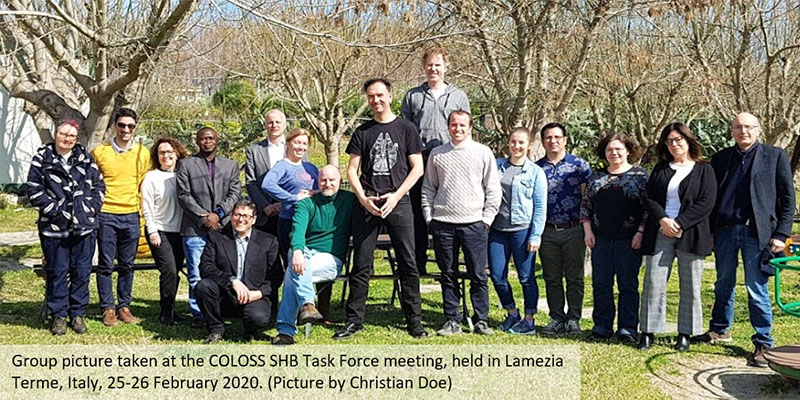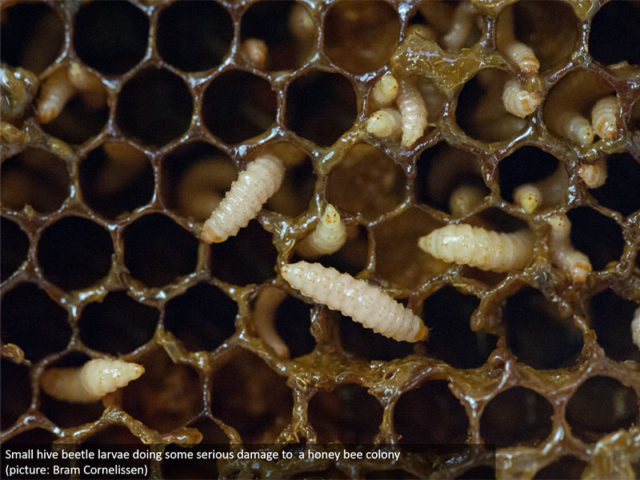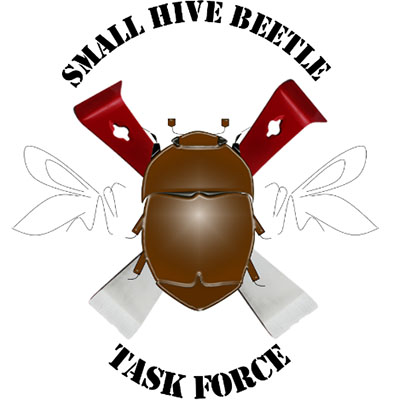Small hive beetle
The small hive beetle (Aethina tumida) is a honey bee pest, which can severely damage honey bee colonies. While they are considered a minor pest in most of their natural area of distribution in sub-Saharan Africa, they cause greater concern in their invasive range. Currently, small hive beetles can be found on every continent, except Antarctica. In the invasive range, they not only affect their natural host, Apis mellifera, but other honey bee species, bumble bees, stingless bees and possibly even other hosts as well. The impact on native fauna is unclear. What is clear, is that only with coordinated research efforts can we deal with the small hive beetle and minimize the consequences for bees, beekeepers and other stakeholders. And that’s where the Small Hive Beetle Task Force comes into play!

The Small Hive Beetle Task Force is a network of close to 100 researchers from 30 countries all working on small hive beetles research in one form or another. Together we conspire to ignite our endeavour to learn more about the small hive beetle and most importantly:
To pave the way for optimal control and containment of the small hive beetle as a global honey bee pest, by dedicated and joint research.
Current objectives
The task force is continuously looking to progress their scientific objectives. The main topics we circumnavigate are:
- to improve diagnostic methods for early detection of small hive beetle.
- to improve and increase small hive beetle control options.
- to better understand our nemesis’ biology and ecology.
This has resulted in the following ongoing projects.
Please contact the coordinators or TF chairman for more information:
Ring test for molecular diagnostic tools (coordinator: Peter Neumann)
The current standard for molecular diagnostic techniques to identify small hive beetles are outdated and possibly lack sensitivity. This project aims to set the standard for small hive beetle molecular diagnostics by comparing molecular test.
Improving tools for small hive beetle management (coordinator: Mary Reed)
We aim to publish a state-of-the-art handbook for small hive beetle IPM strategies.
Better Traps for control and diagnostics (coordinators: Giovanni Formato and Marc Schäfer)
to test existing traps in a comparative setting and improve trap options for diagnostics and control.
Survey on the impact of small hive beetle (coordinator: Audrey Sheridan)
We will develop and execute a survey to better understand small hive beetles’ economic impact.
Understanding Mass Reproduction (coordinator: vacancy)
Small hive beetles can sometimes mass reproduce in colonies. The how and why of it all is not understood. We aim to gain insight in this. The first objective here is to target a specific group of beekeepers who run into this issue a lot. We will survey them, to see if there is any information we can get that will pinpoint to this recurring question.
Other selected activities
- The BDEG (Beetle DNA Expert Group) aims to bring together experts to discuss and allign techniques used in molecular diagnostics. The goal is to eventually expand to include other areas of honey bee pathology. (Expert group coordinator: Marga van Gent)
- Update the bee book chapter on SHB in 2021
- Update the OIE chapter
SELECTED OUTPUT
Check our research gate page for regular updates on member publications.
- “How to slow the global spread of small hive beetles, Aethina tumida” Full Article
- “How to Catch a Small Beetle: Top Tips for Visually Screening Honey Bee Colonies for Small Hive Beetles” Full Article
CONTACT
Are you interested in joining this COLOSS task force?
If so, please contact one of the task force co-chairs below.












